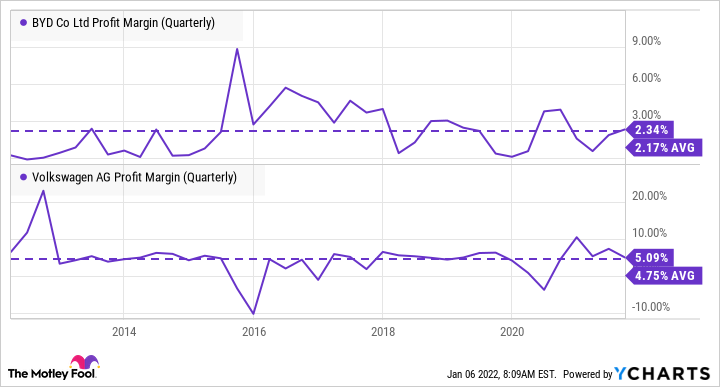Chinese company BYD (BYDDY 0.41%) (BYDD.F 0.20%) is solidifying its position in the global electric vehicle (EV) market. BYD sold 593,745 electric vehicles, including 272,935 plug-in hybrids, in 2021. That makes it the fourth largest EV manufacturer in the world after Tesla (TSLA 0.04%), Volkswagen (VWAGY 0.18%), and SAIC. Does that make BYD stock a buy? This may help you decide.
BYD's focus on EVs
BYD was started in 1995, but it wasn't until 2003 that it began manufacturing automobiles. In 2020, the company derived 53% of its revenue from its automobile operations. BYD's top EV models include Han, Tang SUV, Yuan, Song Pro, and Quin Pro. In December, BYD sold 13,701 units of its Han sedan. Of these, 10,301 units were fully electric. The company sold 9,000 units of its Tang SUV, while its Yuan series sold 8,577 units in December. Overall, BYD sold 92,823 plug-in vehicles in December.

Image source: Getty Images.
Plug-in vehicles accounted for nearly 95% of BYD's vehicle sales in December, indicating the company's clear shift toward electric from internal combustion engine vehicles.
Apart from automobiles, BYD is involved in the manufacturing and assembly of mobile handset components, rechargeable batteries, and photovoltaic products. BYD has been growing its revenue handsomely over the years.
BYDDY Revenue (Quarterly) data by YCharts
The company's average quarterly year-over-year revenue growth has increased to around 30% in the last two years. In the first nine months of 2021, BYD's revenue grew 38% year over year.
BYD controls roughly 18% of the Chinese plug-in vehicle market. As a top EV player in a fast-growing Chinese market, BYD has a long growth runway. Its scale and manufacturing expertise give it an edge over relatively newer entrants in the Chinese EV market.
Should you buy BYD stock right now?
BYD's growth in the EV market looks impressive so far. The stock is trading at a lower price-to-sales (P/S) ratio than its peers in the EV segment.
BYDDY PS Ratio data by YCharts
It also looks attractive compared to some of the newer entrants, like Lucid or Rivian, which have generated hardly any revenue so far. Plus, BYD has been generating profits for years.
However, before you conclude that BYD is the next Tesla or that it should be trading at a comparable valuation, keep in mind that BYD generates fewer profits relative to its sales as compared to Tesla or even Volkswagen.
BYDDY Revenue (TTM) data by YCharts
That gets reflected in its lower profit margin. Tesla, arguably, commands a high valuation since it has generated higher margins in recent quarters, but whether they are sustainable remains to be seen.
Even compared to Volkswagen, BYD's margins are much lower.
BYDDY Profit Margin (Quarterly) data by YCharts
BYD's comparatively low margins likely result from stiff competition in the Chinese market. They also reflect the fact that BYD is targeting a mass market with lower-priced models, which generate lower margins. Its non-EV operations could also be hurting its overall margins.
Chinese manufacturers often operate at significantly low margins to gain market share. That isn't necessarily a bad strategy. Overall, BYD has been growing its sales, and profits over the years. It is a dominant player in the Chinese EV market. Taken together, these factors make BYD attractive for value investors, like Warren Buffett, whose firm Berkshire Hathaway holds a nearly 8% stake in BYD.
Of the nearly 6 million EVs sold globally in 2021, around 2.9 million units were sold in China. The Asian country is expected to see continued growth in EV sales in the coming years too. BYD stock looks like an attractive way to bet on the Chinese EV growth story. All in all, BYD stock looks like an appealing buy right now.









